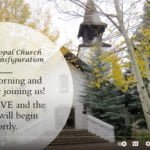Tradition refers to this day as Spy Wednesday, so named because Egeria’s journal tells us that the gospel narration of Judas secretly fixing the price and details of his betrayal of Jesus was read in Jerusalem on the evening of Holy Wednesday. She records the public reading was so disturbing to the gathered believers that they “groan and lament at this reading in a way that would make you weep to hear them!” (Egeria, Travels, para. 34)
 Our local tradition situates our poignant Stations of the Cross worship on this day, recreating in the interfaith chapels the tortured path Jesus labored to walk from Jerusalem’s Temple Mount to Golgotha. By very brief walks inside the chapels, led by anyone wishing to physically carry the cross from station to station, and by pausing at each station to prayerfully consider Jesus’ experience at each step in his suffering and execution, we come as close as possible to the Via Dolorosa, the Way of the Cross.
Our local tradition situates our poignant Stations of the Cross worship on this day, recreating in the interfaith chapels the tortured path Jesus labored to walk from Jerusalem’s Temple Mount to Golgotha. By very brief walks inside the chapels, led by anyone wishing to physically carry the cross from station to station, and by pausing at each station to prayerfully consider Jesus’ experience at each step in his suffering and execution, we come as close as possible to the Via Dolorosa, the Way of the Cross.
Tradition also directs us on this day to the third Servant Song of Second Isaiah, found in Isaiah 50:4-11. This third Servant song is entirely the voice of the Servant, alternatively both a single person and perhaps the nation of Israel herself corporately. The Servant proclaims,
The LORD God has given me the tongue of a teacher, that I may know how to sustain the weary by a word. Morning by morning he wakens my ear to listen as those who are schooled. The LORD God has opened my ear, and I did not rebel…I gave my back to those who struck me, and my cheeks to those yank out the beard. I never hid my face from their insults and spitting. The LORD God helps me, therefore I have not been disgraced; therefore I have set my face like flint…he who vindicates me is very near….it is the LORD God who helps me; who then can declare me guilty?
Isaiah 50, various verses
We see the mission of the Servant amongst his own people and confronting his adversaries. He speaks hope and encouragement to those exhausted by their life circumstances. He is being guided and taught by God even as he teaches others. He is actually open to being guided; he does not rebel when being disciple by God’s grace. And he knows how to stand in the face of persecution. He knows first-hand how to suffer for God. Rather than feeling dejected and conflicted through suffering, the Servant feels justified and vindicated! Nothing will distract or dissuade him from completing his life purpose of being a servant to his own people and a light to the nations. Despite severe confrontation from human authorities, the Servant trusts in the God who gave him his divine mandate. If good with God, everything else can fall apart.
Again, is it so hard to understand how our Christian forebears raced to these particular scripture word-pictures to find an accurate image of Jesus, their Savior and Lord? Even centuries later, these verses portray the crucified Messiah they knew and witnessed as Jesus manifested every Isaiah prophecy concerning the suffering Servant of the Lord. The disciples certainly did not, and I would argue could not, adequately comprehend what Jesus was doing on the cross until after His resurrection. As He predicted, only in a post-resurrectional world, guided by the Holy Spirit, did they begin to understand the true nature of God manifested in the sacrificial suffering and death of Christ. Only then could they understand that Jesus was not acting like Second Isaiah’s Servant figure, never actually named by Second Isaiah. Jesus was indeed the Servant himself, fulfilling the Servant’s salvific mandate prophesied all those centuries earlier! Jesus brings hope to those so exhausted by life! Jesus is guided by His Heavenly Father as He teaches us! Jesus listens without rebelling! Jesus stands in the face of horrific suffering to deliver God’s message to His people! Jesus trusts that God will vindicate Him, so much so that He even forgives those declaring Him guilty and unfit to live!
 Brothers and sisters, as we enter the saving mysteries of our salvation beginning tomorrow afternoon, we are invited to make the leap of faith that the disciples could not. We live not only in a post-modern world, but so much more significantly, in a post-resurrectional reality! Jesus is alive, resurrected to every place and time in the words of the beautiful Easter hymn. Holy Week is not about death, but authentic, poignant life with God!! Have we?! Have we connected the Servant’s gentle yet strong teaching to the actions of Christ this week?! Have we wept with those earliest Christians over the gut-wrenching narrative of His betrayal by one of His very best friends, trading the life of Jesus for silver coins? Have we listened and not rebelled for God’s word for our lives here and now?! Can we take up our cross and stand alongside Christ to endure and watch Him endure such monstrous suffering?! Can we trust God like that?!
Brothers and sisters, as we enter the saving mysteries of our salvation beginning tomorrow afternoon, we are invited to make the leap of faith that the disciples could not. We live not only in a post-modern world, but so much more significantly, in a post-resurrectional reality! Jesus is alive, resurrected to every place and time in the words of the beautiful Easter hymn. Holy Week is not about death, but authentic, poignant life with God!! Have we?! Have we connected the Servant’s gentle yet strong teaching to the actions of Christ this week?! Have we wept with those earliest Christians over the gut-wrenching narrative of His betrayal by one of His very best friends, trading the life of Jesus for silver coins? Have we listened and not rebelled for God’s word for our lives here and now?! Can we take up our cross and stand alongside Christ to endure and watch Him endure such monstrous suffering?! Can we trust God like that?!
These are not easy questions, but then again, we’ve not been called to an easy, convenient or comfortable faith. Shall we set our faces like flint to follow Jesus and not look away from His Passion, Death and Resurrection?! Let us pray,
Lord God, whose blessed Son our Savior gave his body to be whipped and his face to be spit upon: Give us grace to accept joyfully the sufferings of the present time, confident of the glory that shall be revealed; through Jesus Christ your Son our Lord, who lives and reigns with you and the Holy Spirit, one God, for ever and ever. Amen.

